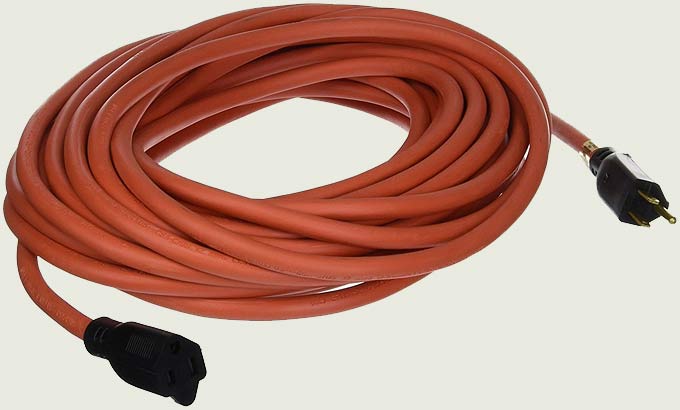Best Extension Cord For Generator – Heavy Duty Gauge Recommendations
Generator Extension Cord
The most common temporary use of a portable generator is with an extension cord to a refrigerator. Maybe a chest freezer too. Some lights. Maybe even a furnace during winter (if wired appropriately), or air conditioner during summer.
The best extension cord for your generator is one that is spec’d to handle the maximum power that’s being delivered between the generator itself (the rating of the specific generator output/outlet being used) and the device or devices plugged into it (like a refrigerator, or whatever else).
It does make a difference having the right or best extension cord (or cords) when powering appliances and other devices from a portable generator. It may affect how the appliance will run, and, the overall safety of the interconnection.
( Jump to specific extension cord recommendations )
( Jump to generator power cord Y-splitters )
Extension Cord Gauge – It Matters!
What difference does gauge make?
If the extension cord is ‘too small’, it may likely restrict the power necessary to safely operate the loads that are plugged in. The cord, and the ends, may heat up. And the appliance itself may operate poorly, or worse…it may damage.
What do I mean by ‘too small’? I mean the internal wire conductors themselves. Wire is rated in “gauge”. Thick wire has more capacity for power (Watts, Amps) than thin wire (logical).
Don’t let the thickness (appearance) of the extension cord fool you!
Generally, a thicker appearance (fatter cord) probably has heavier gauge wires inside. But that’s not always true! It could just be a thicker outer jacket. You’ve got to read the labels!
Check the gauge!
There are LOTS of extension cords that are #16 and #14 gauge. I recommend at least #12 gauge wire conductors in a extension cord used with a typical portable generator. Check the package. Somewhere on the label it will show the gauge.
The logic may seem backwards. But for wire gauge size, the smaller the gauge number (#), the more power (amps / watts) it can handle. So #12 gauge can handle more power than #14 gauge, etc..
NEC Ampacity Limits
The NEC (National Electrical Code) sets limits on the amount of Amps (current) that wire conductors may carry (for safety / overheating). There are variations depending on wire insulation/jacket, temperature, use.
The following is from NEC Table UL486E for copper conductors:
This is for not more than 3 conductors in the cable:
| WIRE GAUGE | MAX AMPS |
|---|---|
| (Max 3 bundle) | (Table: UL486E) |
| 14 AWG | 15 Amps (1800 W) |
| 12 AWG | 20 Amps (2400 W) |
| 10 AWG | 30 Amps (3600 W) |
Note: Extension cord specs vary (materials and other factors). Check the label!
There are a number of factors that contribute to the ratings for extension cords, and they vary somewhat. Here are the specifications when applying ‘Ohms Law’ (P=IE) to the NEC wire gauge limits listed above.
14/3 extension cord
15 amps maximum
1800 watts @120 volts
12/3 extension cord
20 amps maximum
2400 watts @120 volts
10/3 extension cord
30 amps maximum
3600 watts @120 volts
Note: The “/3” simply means there are three wires within the insulation of the extension cord. One is for ground (green), one for “hot” (black), and the other for neutral (white).
How does length affect extension cord ratings?
When determine the best extension cord for your use, length matters! Voltage drop. Most typical extension cords for outdoors come in 25 foot and 50 foot lengths. All wire has some resistance (depends on conductor gauge, type and other factors). The longer the wire (extension cord) the more resistance (and voltage drop!).
With regard to a generator extension cord, in most cases you will probably be within 50 feet or less to run a cord from outside, through a window into the home (for example).
When is #10 gauge Extension Cord Better?
When you’re looking at 100 feet or longer, it (voltage drop) becomes potentially problematic depending on the appliance. In these cases it’s better to use a heavier gauge #10 extension cord.
Yes, if your generator outputs more than one outlet circuit, the overall load may be balanced with an extension cord for each circuit.
For example, one of my generators is rated for 3500 watts. It has several conventional 120-volt outlets (and a high power multi-prong outlet). I might use two 12/3 extension cords (one for each 120-volt outlet circuit) to deliver power inside the home to my various appliances if I need to.
Use Outdoor rated extension cords
Some are rated for indoor only use, while others are designed for outdoor use. For use with a portable generator, you definitely want outdoor rated. The differences are in the insulation material, strength, and the ends themselves (plug & receptacle design).
Warning signs of overloaded extension cords
- extension cord becomes warm, very warm, or hot
- the generator circuit breaker keeps tripping
- your appliance is making a funny noise
The Best Extension Cord for a Generator
A good general purpose choice is a 10/3 (#10 gauge) outdoor rated. This may be ‘overkill’ to an extent, but it will be a best choice for never being concerned about overload on typical 120-volt outlet circuit.
If you’re just concerned about an extension cord from a generator to a refrigerator (the most common use during power outage), the 12/3 listed below will be absolutely fine. For heavier loads, I recommend the 10/3.
10/3 50-Foot Triple Outlet Outdoor Rated Extension Cord
12/3 50-Foot Best Rated Overall Outdoor Extension Cord
(view on amzn)
10/3 will perform better than 12/3 and NEC specs (listed above) indicate power handling up to 3600 watts. Additionally there will be less voltage drop under load. Theoretically enabling a longer run.
Tip: My experience has been that you are not going to find a 10/3 extension cord with a household style plug / outlet that lists its rating higher than 15 amps (or 20 amps with a T-blade plug) due to regulations (even though the #10 wire inside may be capable of handling the NEC rating).
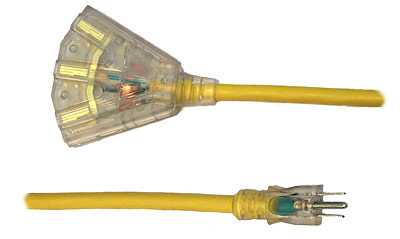
Generator Power Y-Splitter Cord
A portable generator typically has a high power outlet which is multi-pronged (3 or 4 prongs, depending).
I use one of these Y-splitters on my own portable generator. It’s 10-gauge 4-wire cord which splits power from an L14-30R locking receptacle into two standard 20A outlets.
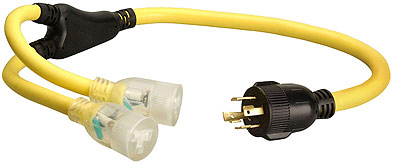
>> Generator Y-Splitter 10/4
(view on amzn)
I also have one of these for another generator. 10/3 Splitter Y Adapter, L5-30P to (2) Lighted 5-20R.
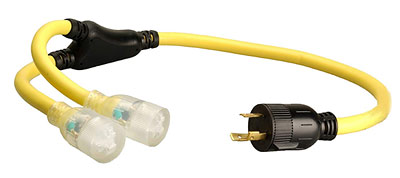
>> Generator Y-Splitter 10/3
(view on amzn)
30 Amp Generator Extension Cords
You can buy specific 30 amp generator extension cords / cables. There are varying configurations.
Here’s one with 10 gauge wire that converts a 30-amp generator locking outlet to four 20-amp (120-volt) household outlets and extends your power up to 25 feet:
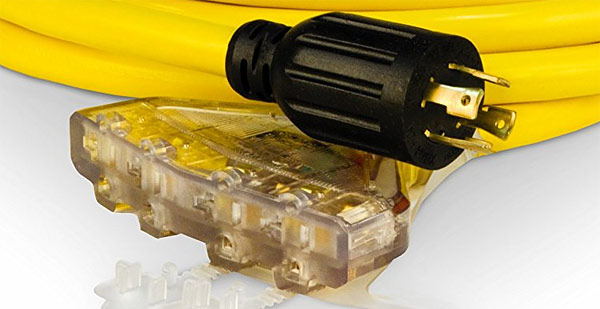
>> 30-Amp Generator Extension Cord ( L14-30P to four 5-20R )
(view on amzn)
MORE:
30 amp Generator Cords
Generator Adapters
(This article was originally published during 2018 and has been updated with more information)
[ Read: Cold Weather Extension Cord That Remains Flexible & Won’t Crack ]
Read more:
Best Fuel Additive For Generators
Generator Maintenance For Preparedness
Generator Safety

